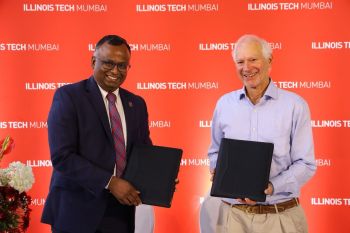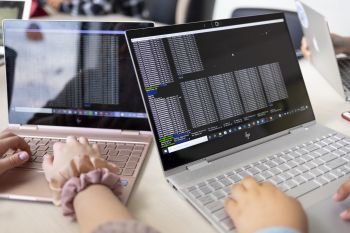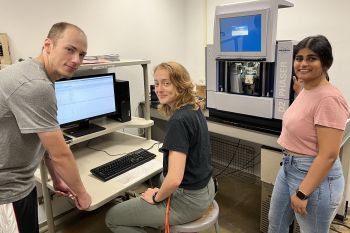Illinois Tech Creates College of Computing to Fuel Chicago’s Tech Rise
Change Infuses Computation, Data Science Thinking Across All Disciplines

CHICAGO—Illinois Institute of Technology, also known as Illinois Tech, has created the College of Computing as part of an effort to drive Chicago’s thriving tech ecosystem by educating a future diverse workforce that is rigorously trained in data and computation.
The new college will start on June 1, ahead of the fall 2020 semester. The College of Computing will house Illinois Tech’s computer science, data science, artificial intelligence, applied mathematics, cybersecurity, and information technology and management programs.
However, the new college is more than just a restructuring at Chicago’s only tech-focused university. The unique effort ensures that every student is fluent in data and computing, skills that are increasingly important in all professions.
“We will create a new way of educating students, both within computing and horizontally across campus,” said Peter Kilpatrick, Illinois Tech’s provost and senior vice president for academic affairs. “Computation and data will be infused into the core of each educational discipline.”
The new college will lead the effort to give every student—including those in engineering, architecture, science, humanities, design, law and business—a firm foundation in computation and data science thinking. This effort to integrate computing across all programs is among the first at any major university in the country.
Chicago’s business and tech leaders are welcoming the change.
“Illinois Tech and the College of Computing will play a critical role in P33’s vision of building a stronger tech economy here in Chicago,” said Brad Henderson, chief executive officer of P33, an organization working to transform Chicago into a tier-one technology and innovation hub and to promote inclusive economic growth. “Through the creation of this new college, Illinois Tech is helping to ensure that our local talent pool is among the best in the nation and prepared to tackle the challenges of tomorrow’s tech ecosystem.”
Chris Gladwin, co-chair of P33 and Illinois Tech trustee, helped spearhead the push for a College of Computing to meet the needs of the twenty-first century labor force. Gladwin founded big-data storage company Cleversafe, which was housed at Illinois Tech’s University Technology Park before it was sold to IBM.
“For years, Illinois Tech has been a key driver of the Chicago economy by empowering its graduates with the skills needed to succeed in tomorrow’s industries,” said Gladwin. “This leading approach to computing education is a key component in Illinois Tech establishing itself as a global top-tier tech university and empowering Chicago to advance to a global top-tier tech city.”
A donation by Gladwin established the Illinois Tech Active Computational Thinking (ACT) Center, which will serve as a nexus for computation partnerships both within the school as well as with community tech partners.
The goal is to bring a dynamic and nimble approach to educating students by responding to evolving changes in the computing field. This means that new programs will be added when needed, and old programs will be retired as technology changes.
“We also want to be agile and quickly respond to industry changes,” said Lance Fortnow, a world-renowned computer scientist who will serve as the new dean of the College of Computing.
“After the first year, the college will work from the ground up, rethinking the basic concepts of disciplines, courses, and degrees,” said Fortnow, who came to Illinois Tech in 2019 after previously serving as the chair of Georgia Institute of Technology’s (Georgia Tech) School of Computer Science. “In this fast-changing world, one cannot think of education ending at graduation, and the college will develop programs that will allow our alumni to continue a lifelong educational process that will propel their careers.”
This change will bolster existing education and research beyond computing and data science. Students will also learn how to use data responsibly and ethically, grapple with data privacy issues, and utilize cutting-edge tools to tackle the challenges and opportunities of the future.
“Illinois Tech is already providing students with a very strong foundation in computation and data skills, but now we are going to do it in an integrated way across all academic disciplines, something we believe has never been accomplished in a comprehensive university with law, architecture, and the full range of disciplines,” said Alan W. Cramb, Illinois Tech’s president.








